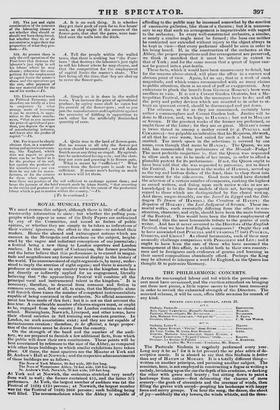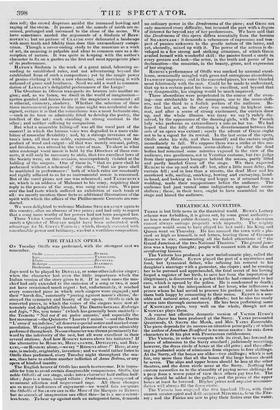THE PHILHARMONIC CONCERTS.
AFTER the unexampled labour and toil which the preceding con- cert must have occasioned, and the exertion attendant on bringing out three new pieces, a little repose seems to have been necessary in order to recruit the exhausted strength of the Directors. The annexed scheme, it will be seen, offers little occasion for remark of any kind.
FOURTH CONCERT—MONDAY, APRIL 21.
wry T.
Sinfonia. Pastorale Big/WOVEN.
Aria. Signor TA Milnal NT. Mnometto Second(' Itosium.
Fantasia. Flute ubligato, Mr. NICHOLSON N tenement.
Aria, Madame SToexuaussis," Sol pile dir" F. Fames.
Overture, Oberon C .151. TON WEBER.
• CT
Sinfonia, Letter V. /Urns'.
Aria. Signor Evans,, "Vial tn." Amur Rohm DONIZETT1.
Air Van e, Violin. M. Guys, from Brussels.. Gulfs.
Terzetto, Madame STOCKHAUSEN, Signor RUBIN!. c Signor TA " parli Pamore," OteUu Rossm. Overture, Le Rocine di Palazzi A. Rounrao. Leader, Mr. WEICHSEL—Conductor, Mr. Ilisnor.
The Pastorale Sinfonia is regalarly performed every year. Long may it be so! for it is (at present) the tie plus ultra of de- scriptive music. It is absurd to say that this Sinfonia is better than any of HAYDN or MOZART. It is a totally different thing— written on another principie, and pursuing another subject. The musician, here, is not employed in constructing a fugue or writing a melody, lavishing upon the one the depth of his erudition, or decking the other with grace and beauty ; but sitting down to paint a landscape from nature—first delineating the charms of mere scenery—the gush of streamlets and the murmur of winds, then filling the groves with sound—peopling his landscape with happy faces and merry groups. You hear the song, the dance, the shout. of joy—suddenly the sky lowers, tine winds whistle, and the than- ders roll; the crowd disperses amidst the increased howling and raging of the storm. It passes ; and the sounds of mirth are re- . sumed, prolonged and increased to the close of the scene. We have sometimes needed the argomento of a Sinfonia of BEET- HovEN's ; but no-picture oi' CLAUDE ever delineated a landscape with more truth and fidelity than does this extraordinary compo- . sition. Though a never-ending study to the musician as a work of art, its meaning is palpable and clear to common ears as a de- scription of nature. It was quite in keeping with the author's character to fix on a garden as the first and must appropriate place of its performance.
HAYDN'S Sinfonia is the work of a great mind, labouring ac- cording to established rules, and not adventuring beyond the established form of such a composition; yet by the magic power of genius clothing it with a new character, and enriching it with unheard-of grace and loveliness. Need we add a word in commen- dation of LINDLEY'S delightful performance of the Largo? The Overture to Oberon transports its hearers into another re- gion; and, as we listen, we dwell in the world of imagination— sprites gambol and fairies dance at the magician's command: all is etherial, visionary, shadowy. Whether the selection of these three instrumental pieces for the same night was accidental or de- signed, certain it is that the coincidence was a most fortunate one, —each in its turn so admirably fitted to develop the poetry, the intellect of the art ; each standing in strong contrast to the other ; and neither suffering by comparison. But what a miserable falling-off was all the vocal part of the concert! in which the human voice was degraded to a mere exhi- bition of muscular flexibility ; and, by a strange inversion of na- ture's laws, all that was noble, expressive, intellectual, was the product of wood and catgut— all that was merely sensual, paltry, and frivolous, was uttered by the voice of man. To show in what utter contempt vocal music is held by the Directors of these con- certs, it will only be necessary to state, that two excellent laws of the Society were, on this occasion, unscrupulously violated at the bidding of the singers. One of these is, " that no piece shall be performed without a rehearsal;' the other, " that no piece shall be mutilated in performance:" both of which rules are constantly and rigidly adhered to as far as instrumental music is concerned. But of the vocal pieces not one was rehearsed; and TAM BURI air, which is an address of Mehemet to his army, requiring their reply in the pauses of the song, was sung senza corn. We pass over the bad taste which suffered an exhibition of such trash at all: we merely mention. these facts as additional illustrations of the spirit with which the affairs of the Philharmonic Concerts are con- ducted.
We were delighted to welcome Madame STOCKHAUSEN again to this country, after an absence of two years; and had only to regret that a song more worthy of her powers had not been assigned her.
Three Violin Concertos having been played in four concerts, surely a Quartet of Mozser might have been substituted with advantage for M. GHYs'S Fantasia; which, though executed with considerable power and brilliancy, was but a worthless composition.























 Previous page
Previous page